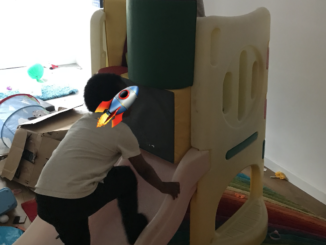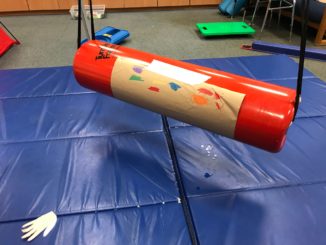This post has an audio and video recorded version for those who prefer to learn by hearing rather than by reading. Scroll to the bottom for the video of me reading it.
All humans’ bodies develop strength from the core first, then working outward. The core muscles, the muscles that control your trunk, to lean and wiggle and rotate, are the first things that develop. Next are the muscles of the biggest joints that are the closest inward…the shoulders and the hips. Then it continues outward from there. Next are the elbows and knees. Then the wrists and ankles. Then the fingers and toes. It’s going from inward to outward.
The thing is, children need LOTS of strength in their core to do things like…be able to sit up without needing to lean on something. That’s true for 6-month-olds but it’s also true for 6-year-olds! Many kids do not get the chance to develop enough core strength. They tend to be very floppy and lean or drape on furniture, other people, the back of their seat, their elbow on the table, because their core is not strong enough to hold them up for an extended period of time.
Core strength is important for baby milestones like rolling over, sitting up, crawling, walking. It’s also important for older children. You can’t do monkey bars or a cartwheel without core strength. You can’t sit upright and sit still without core strength. You can’t walk steadily in the hallway without leaning on things or fatiguing without core strength. It’s really the heart of almost everything humans do in a day and tons of things that children have to do at school.
And it develops naturally through play if children are given the chance to play for enough hours before these things start becoming expectations. If they have enough time to put themselves into weird positions and crawl into tight spaces and climb things and flip themselves upside down and then right side up again and roll around and jump around and run around, their cores get stronger and stronger!
I mentioned how the joints develop from inward to outward, too. The shoulders need to be strong and stable before the elbows, before the wrists, before the fingers. Think about how babies learn to reach for and pick up objects. First they’ll learn how to basically fling their entire arm in the direction of what it is that they want, and maybe touch it or slap it. Then they’ll learn to slowly refine that movement until they can reach for something and grab it with their whole hand opening and closing. And over time they learn to pinch at something small with their fingers, or to pick it apart or pinch pieces of it or twist it or interact with it. They’re still learning that into toddler years!
So then three-year-olds and four-year-olds need to be doing tons of work to strengthen and stabilize the bigger, closer-in joints before they are working on things that take the smaller, further-out joints. And that “work” is their play. They need to carry things, push things, pull things, pour things, scoop things, pinch and twist and dig and hammer and smash and break and rip and pick at and build and squeeze a zillion things before all those muscles have developed the kind of coordination it takes to do incredibly precise tasks like writing letters or buttoning small buttons or cutting with scissors.
This deep respect and understanding of PLAY is something that absolutely, completely needs to be protected. Because it’s currently under attack. It’s not an attack on purpose. It’s not because adults are just mean and want to hurt children. It’s actually the exact opposite. It’s with pure intentions, because adults want to do what’s best for children. And so the adults think about what kinds of demands and expectations there will be for children when they get to kindergarten or first grade, and they think that they’ll help make the world a little easier for the child by trying to start teaching them things ahead of time.
The problem is that their bodies just physically are not ready for that yet. Children cannot learn what they are not ready for–and on the flip side, once they’re ready for it, they will become super fascinated by it and seek it out!



